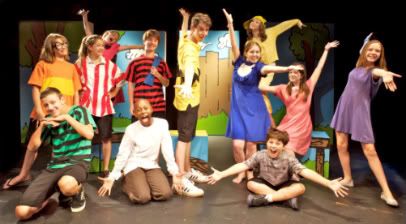
By Ailsa Ilott
It is simply astounding how, with all the quality work being performed and produced under the umbrella title of ‘children’s theatres’ today, it is still regarded as a lesser art form by many from the theatre world. A mere mention of the word ‘children’s theatre’ conjures up images of over-acted stories about the Little Mermaid and rainy Wednesday afternoons spent in school theatres learning that getting pregnant and doing drugs is a bad thing. But this prejudice could not be further from the truth. For many years now quality drama has been written, directed and performed by professional theatre companies specifically for younger audience. I therefore ask the question: why is this still unknown to the wider community? And why, in a supposedly liberal field such as performance, is there still a stigma and disregard for this area of theatre?
This notion of a bias against children’s theatre is continually reinforced throughout the theatrical press, such as website What’s On Stage
‘It is not usual form to feature plays aimed at children aged three and over on these pages, but just occasionally, a production in this field will transcend its generic limitations to become a truly exceptional piece of work’ Philip Holyman
How can something so misinformed and clichéd be written by someone so obviously knowledgeable about theatre? Why can’t all theatre be reviewed in terms of its quality without presupposing certain limitations due to the generic field it happens to find itself placed in? Surely that is the point of a review. Shakespeare has its own limitations, so does Noel Coward or Sarah Kane but would that stop someone publishing their thoughts on it? I think not.
This statement is a fine example of the general feeling and consensus held by members of the industry. This opinion seems to perpetuate the ideology that children’s theatre is something to be looked down upon due to it apparently being artistically empty and ‘simple’. Unfortunately, those quick to sneer and scorn don’t seem to understand that to keep the attention of children and young people for 2 hours exceptional acting skills are required. The actors have to negotiate their performance depending on the change of dynamics a different audience brings. A child or young person will behave and respond differently depending whether they are in a school party of friends or watching the show with their family. This is no mean feat. It has to be a deeply artistic piece of work that is capable of not only grabbing the attention and imagination of the children, but also their parents. Yes, those adults who would otherwise not step foot inside a theatre need to be impressed. After all, who else is going to pay for the children to come back?
On the continent, this genre of performance is considered both exciting and different and it is taken seriously by those in the arts. So why is this not true for Britain? Could it be the case that it is our media that perpetuates the idea of theatre for young people being less impressive or vital? In the celebrity obsessed society, are gossip magazines teaching that you haven’t made it as an actor if you’re not the next Tom Hardy or Emily Blunt?
Or is this a line of thought that has trickled down from those higher up in the business? Many high profile actors and writers are incredibly supportive of this field giving not only their time but also their money acknowledging its importance to carry on its work. But would we see these same actors performing a 4/6 week run in a show aimed for younger audiences solely for the artistic exploration and joy of it? Apart from an Ian McKellen panto stint at the Old Vic, there has yet to be an example of this. At least not to create serious drama anyway.
Surely the reason we create theatre is to affect people’s consciences, to react against the actions and consequences of societies actions and to make people think about, and touch upon human emotion, be it old or young. We have a duty to teach and learn from the next generation of actors/directors/stage managers and designers. Not to seek the fame and glory of it all. Why then, when our society tells us that without a Bafta nomination or 5 stars from the Guardian we are failures, do we believe them?In young peoples theatre it is the theatre that comes first. If they are already bored, I don’t think the young audience will care so much which ex-RSC actor is heading the all star cast. They are the hardest audience any actor/director is ever going to try and impress and yet the rewards when the hard work is appreciated are the greatest.
So here is where I say thank you to those whose dedicated work has touched and changed so many young peoples lives. The tide is slowly changing on those generically limited opinions. And to those who believe that theatre of this kind is easy or less worthy artistically, then I would say to them: Come and have a go if you think you’re hard enough!





No comments:
Post a Comment